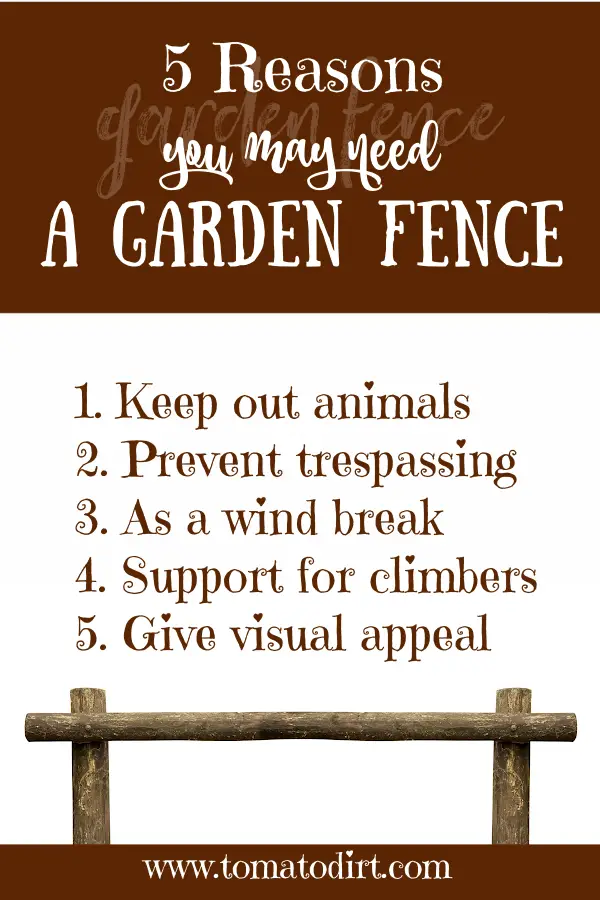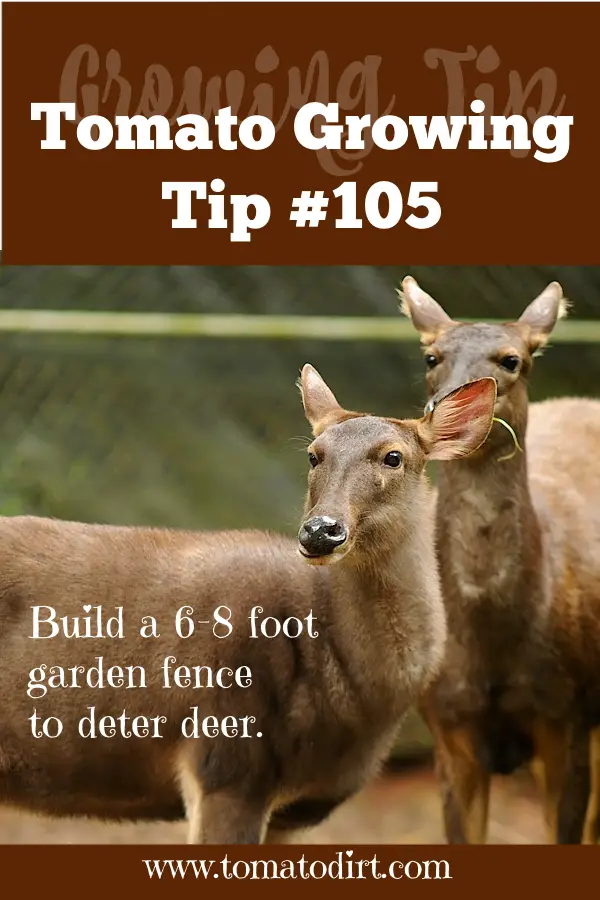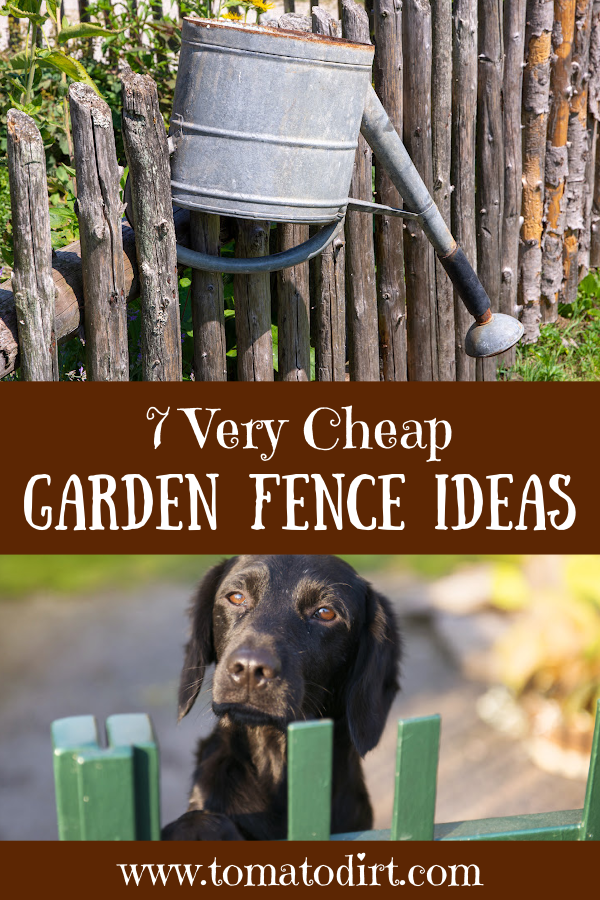FREE: 10 Must-Know Tomato Growing Tips Get The Guide
Read our affiliate disclosure here.
7 Very Cheap Garden Fence Ideas
Since 2010, Tomato Dirt has garnered 4.8+ million views, making it the web’s leading online source for growing tomatoes in the home garden. Award-winning writer and Tomato Dirt owner Kathy Widenhouse has helped thousands of home gardeners grow healthier tomatoes. Be one of them when you get Tomato Dirt’s Growing Guide here.
Updated 12.18.25
One benefit of vegetable gardening is to save money. So if you need a fence, there are plenty of cheap garden fence ideas you can try that can save you money.
But first …
Do I need a fence around my garden?
My husband and I live in suburbia. When we started our vegetable garden a couple of decades ago, we didn’t think we’d need a fence … unless you considered the soccer balls and bicycles and children flying around the place.
We discovered how wrong we were one morning when my husband spied five deer, through the fog, happily snacking on his green bean seedlings.
The bean crop that year was near nil. Ditto for the corn. And let’s not talk about my flower beds.
You may need a fence around your vegetable garden to …
1. Protect your garden from animals
- Deer. They love to munch on tender vegetables and can destroy a garden overnight. A tall fence (at least 6–8 feet) is best to keep them out. And don’t be fooled, like we were, if other homes and buildings are close by. Deer can make their homes as close as 200 feet from humans. All they need are some low hanging branches or side cover with easy entrance and exit routes.
- Rabbits. Like deer, a handful of these small critters can chew through your young plants in an hour or two. A fence with small mesh at the bottom can deter them.
- Groundhogs. These small mammals burrow under fences. If you see raised ridges crisscrossing your property or multiple dirt mounds in your yard, they may have made your home theirs. Keep groundhogs out with an underground barrier about 12 inches deep.
- Squirrels and birds. They’re big snackers. In fact, birds target tomatoes during their fruiting stage, especially when tomatoes begin to ripen. While a traditional fence won’t stop them, adding netting or wire mesh can help protect your crops. And mesh or row covers can do double duty by blocking certain insects from plants, too.
- Pets. Dogs or cats that are diggers can make a mess of your vegetable garden. A fence helps prevent that.
2. Prevent trespassing in your garden
- A fence can help keep neighbors, children, or delivery workers from accidentally trampling your plants.
- If your garden is in a community or shared space, a fence marks your area. In a community garden you can go a step further and display your name on your fence near your garden plot.
- And if you live in an area where garden theft is a concern, a locked gate can help protect your crops. One time we had all the peaches off one of our trees stripped overnight. A fence could have protected our harvest. (Although as we thought about it, we realized that the thief must have been hungry, desperate, or both.)
3. Protect your garden from heavy winds.
Flatlands. Peaks. Open spaces. You know your terrain – and if yours is subject to regular winds, your crops can be at risk. A well-placed fence can act as a windbreak, protecting delicate plants from strong gusts.
4. Offer support for climbing plants
Do you grow peas, beans, cucumbers, tomatoes? Your garden fence can act as a trellis to support your climbers and maximize your space at the same time.
5. Enhance your garden’s visual appeal
A fence can give your garden a more defined, intentional space. And you may choose a special fence style to match your home’s aesthetics.
7 very cheap garden fence ideas
You’re convinced you need a fence. But you don’t want to break the bank to build one. You’re growing your own food to save money and be healthier, right?
Here are seven very cheap garden fence ideas to get you started on the path to constructing your own budget-friendly garden fence.
1. Chicken wire fence
Materials: Chicken wire, wooden stakes or metal T-posts, zip ties or staples
Construction:
- Pound wooden stakes or T-posts into the ground every 4-6 feet around your garden.
- Unroll the chicken wire and attach it to the stakes using zip ties or staples.
- Bury 6-12 inches of wire underground if dealing with burrowing pests like rabbits.
Benefits:
- Very cheap and easy to install
- Keeps out rabbits, small animals, and some larger pests
- Offers good airflow and sunlight access
Best for: Keeping out small animals in suburban or rural gardens
2. Pallet fence
Materials: Free wooden pallets, nails or screws, and a drill
Construction:
- Arrange pallets upright in a row to form a perimeter.
- Connect pallets by screwing them together or attaching them to wooden posts.
- Optional: Stain or paint for a finished look.
Benefits:
- Often free or very cheap when you get pallets from local businesses
- Sturdy
- Can double as a trellis for climbing plants
- Rustic and charming aesthetic
Best for: Small gardens, community gardens, and upcycled garden designs
3. Wire and stick fence
Materials: Free branches or sticks, chicken wire, zip ties or twine
Construction:
- Collect strong, straight branches or sticks (around 3–5 feet long).
- Hammer them into the ground every 2-3 feet.
- Attach chicken wire between the posts using zip ties or twine.
Benefits:
- Virtually free if you have access to sticks or pruned branches
- Keeps out rabbits and small pests
- Blends naturally with the landscape
Best for: Wooded or rural areas where branches are abundant
4. Bamboo fence
Materials: Bamboo poles, twine or wire
Construction:
- Cut bamboo poles to your desired height.
- Tie or wire them together to form panels.
- Secure the panels to wooden stakes or posts.
Benefits:
- Inexpensive if bamboo is locally available
- Lightweight yet sturdy
- Provides a natural, aesthetic look
Best for: Windbreaks, decorative fencing, and urban gardens
5. Recycled fabric or burlap fence
Materials: Burlap sacks, old bed sheets, landscaping fabric, old wire mesh, bed frames – even discarded wooden boards – plus wooden stakes
Construction:
- Pound wooden stakes into the ground every 4-6 feet.
- Stretch burlap or fabric between the stakes and secure with staples or zip ties.
Benefits:
- Provides wind protection for delicate plants
- Affordable. Plus, you can use your creativity to repurpose unused materials.
- Keeps out deer if placed at least 6 feet high
Best for: Windy areas, temporary fencing, and shielding plants from too much sun
6. Twine or rope fence
Materials: Wooden stakes, twine or rope
Construction:
- Hammer wooden stakes around the garden perimeter.
- Wrap twine or rope tightly between the stakes at different heights.
Benefits:
- Extremely low-cost and easy to set up
- Keeps out larger animals like dogs
- Can be taken down and reused easily
Best for: Temporary fencing or marking garden boundaries
7. Plastic mesh or deer netting fencing
Materials: Plastic mesh fencing or deer netting, zip ties, and metal or wooden stakes
Construction:
- Install stakes around the garden.
- Stretch plastic mesh or deer netting between the stakes.
- Secure with zip ties or staples.
Benefits:
- Lightweight and inexpensive
- Protects from deer, rabbits, and birds
- Doesn’t block sunlight
Best for: Deer protection, large gardens, and temporary fencing
Where can I get all this garden fence goodness for free or cheap?
Here are some great places to find cheap or free materials for your garden fence.
1. From other people in your area
- Local construction sites. Ask if they have leftover pallets, scrap wood, or wire they’d give away.
- Facebook Marketplace, Craigslist, Freecycle. Search for free or cheap pallets, wire fencing, bamboo, and stakes.
- Local farms and ranches. Farmers sometimes have extra fencing materials or old wood they’ll sell cheaply.
- Recycling centers and salvage years. Look for old fencing, stakes, and wire mesh.
2. At low-cost stores
- Dollar Stores – Cheap zip ties, twine, or plastic mesh fencing.
- Harbor Freight (USA) – Budget-friendly tools, zip ties, and tarps.
- Home Depot & Lowe’s (USA) and home improvement stores worldwise (Discount Sections) – Damaged or leftover lumber, discounted fencing materials.
- Tractor Supply Company (USA) – Often has affordable chicken wire and deer netting.
3. From natural and upcycled sources
- The backyard or nearby woods. Gather branches for a stick fence or cut bamboo from your own property. Or ask a neighbor for permission to do so.
- Used fabrics. Sheets, blankets, towels – use them as fabric fencing for wind or sun protection.
- Leftovers from home projects. Scrap wood, rope, and nails can be repurposed for your fence.
One more very cheap garden fence idea
Have you ever considered a living fence? Plant fast-growing shrubs or bushes close together around the perimeter of your garden to form a natural fence. You can purchase shrubs on the clearance racks at the local garden center or from Facebook gardening groups. I’ve also found neighbors who want to divide their bushes or have volunteer plants to give away.
This option takes time to grow and build but can be cost-effective in the long run … plus it adds value to your property.
You can build a garden fence without breaking the bank. And your garden fence can not only keep out unwanted invaders, but it can be attractive, too.
More on Starting a Vegetable Garden
Starting a vegetable garden: what you need to know ...
10 Ways to Get the Most From Your Garden Space ...
How To Start a Vegetable Garden Successfully: 10 Tips For Beginner Gardeners ...
What Type of Vegetable Garden Is Best for You?
How to plan a garden layout for growing vegetables and tomatoes ...
Starting a Raised Bed Vegetable Garden FAQs ...
Preparing your soil for planting tomatoes in the home garden
3 Ways to Prepare Your Garden for Spring ...
3 types of planting in rows for your vegetable garden ...
Garden layout ideas on our Pinterest board ...
Return from 7 Very Cheap Garden Fence Ideas to Tomato Dirt home
As an Amazon Associate and Rakuten Advertising affiliate I earn from qualifying purchases.
SHARE THIS PAGE:
FREE! 10 Must-Know Tomato Growing Tips: 20-page guide
Get yours here:






